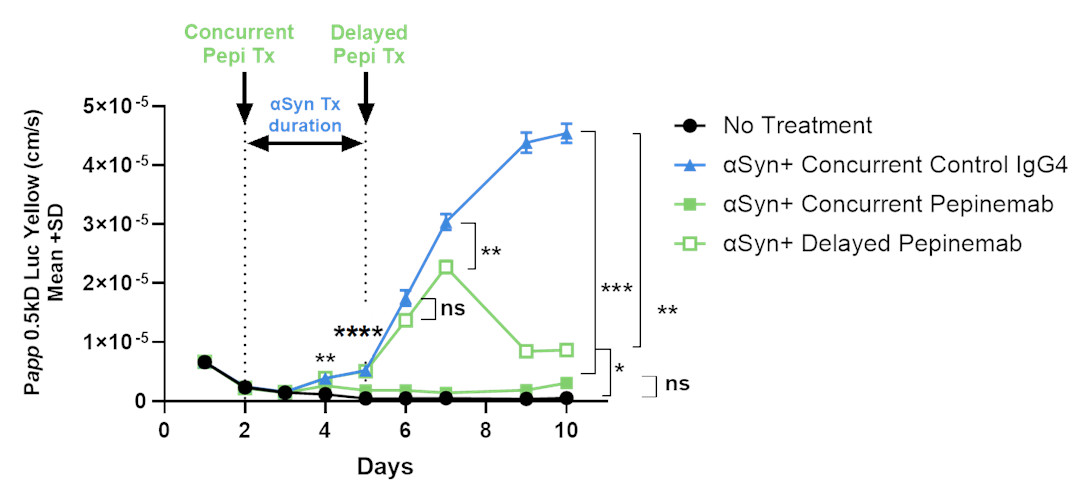ROCHESTER, N.Y., Oct. 31, 2024 (GLOBE NEWSWIRE) -- Vaccinex (Nasdaq: VCNX) today provided an update on new clinical findings from its SIGNAL-AD Phase 1b/2 trial of pepinemab antibody in Alzheimer’s disease.
Vaccinex recently announced positive results of the phase 1b/2 study of its lead product, pepinemab, in early stages of Alzheimer’s disease (AD). The purpose of this report is to share additional data demonstrating stage-specific biomarker and cognitive effects starting with Mild Cognitive Impairment (MCI), the very earliest diagnostic stage of AD, and following through to progression to later stages of mild dementia. Currently approved treatments for AD are designed to reduce expression of Abeta amyloid and appear to modestly slow cognitive decline. The Vaccinex strategy is to intervene early to block astrocyte activation and associated inflammation with pepinemab so as to potentially achieve greater reduction in overall disease activity.
We report today that expression of plasma GFAP and p-tau 217 biomarkers appears to increase predominantly during MCI and that this is inhibited by pepinemab treatment. Glial Fibrillary Acidic Protein (GFAP) is a well-characterized marker of increasing astrocyte reactivity, and p-tau 217 is a peptide fragment of toxic “tau tangles” that accumulate in neurons during disease progression. In the absence of effective treatment, patients typically progress to mild dementia, which approximately corresponds to Mini-Mental State Examination (MMSE) scores of 22-26 . We report that pepinemab treatment at this stage may slow further cognitive decline as evidenced by strong treatment trends for multiple different cognitive measures.
In further support of potential treatment benefit, we performed a proteomic analysis of Cerebrospinal Fluid (CSF) from patients treated with pepinemab or placebo. The results identified several proteins that have been previously reported to increase during normal AD progression but are here shown to be inhibited by pepinemab treatment. These constitute additional disease-associated biomarkers whose inhibition, we believe, further supports the benefit of pepinemab treatment.
Finally, investors will be aware of concerns regarding damage to vascular integrity of brain tissue and the risk of inflammation and hemorrhage due to treatment with antibodies to Abeta amyloid. We have not seen evidence of such effects for treatment with pepinemab antibody. On the contrary, employing a human Brain-Chip model, we were able to demonstrate that damage caused by toxic aggregates of alpha synuclein can be inhibited or reversed by treatment with pepinemab. The results of similar analysis of damage caused by Abeta amyloid in the presence or absence of anti-Abeta antibody will be reported soon.

- Treatment with aSyn fibrils disrupted vascular integrity of brain chip (blue) compared to untreated control (black)
- Concurrent pepinemab treatment significantly inhibited effects of aSyn (green closed squares)
- Delayed pepinemab treatment significantly reversed effects of aSyn (green open squares)
Continued Pepinemab Development
The Company views the results of this AD study in the context of its larger previous randomized phase 2 study in Huntington’s disease (HD), which showed highly significant beneficial effects of pepinemab treatment on HD-specific biomarkers and measures of cognition. The immediate goal of the SIGNAL-AD study was to determine whether effects are consistent in another very prevalent neurodegenerative disease. Further, we report a new finding that pepinemab can inhibit or reverse the damaging effects of alpha synuclein, a key constituent of Lewy bodies that are characteristic of Neuronal Synuclein Diseases including Dementia with Lewy Bodies and Parkinson’s disease, as well as being expressed in ~50% of Alzheimer’s Disease cases. This not only extends the potentially beneficial treatment effects of pepinemab but may also greatly expand the application of this drug to other prevalent neurological diseases. In terms of current clinical development, we believe the most productive path forward is to treat patients with MCI or mild dementia due to AD with pepinemab with the aim of slowing or preventing disease progression and the emergence of additional pathogenic mechanisms. The Company plans to continue partnering discussions for continued development of pepinemab in AD, HD and potentially other neurodegenerative diseases.
Forward Looking Statements
To the extent that statements contained in this letter are not descriptions of historical facts regarding Vaccinex, Inc. (“Vaccinex,” “we,” “us,” or “our”), they are forward-looking statements reflecting management’s current beliefs and expectations. Such statements include, but are not limited to, statements about the use and potential benefits of pepinemab treatment in patients with AD and HD; the potential and prospects for continuing late stage development of pepinemab, including as part of a prospective partnership; and other statements identified by words such as “believe,” “being,” “will,” “appear,” “expect,” “ongoing,” “potential,” “promising,” “indicate,” “suggest,” “apparent”, and similar expressions or their negatives (as well as other words and expressions referencing future events, conditions, or circumstances). Forward-looking statements involve substantial risks and uncertainties that could cause the outcome of our research and pre-clinical development programs, clinical development programs, future results, performance, or achievements to differ significantly from those expressed or implied by the forward-looking statements. Such risks and uncertainties include, among others, uncertainties inherent in the execution, cost and completion of preclinical studies and clinical trials, risks related to reliance on third parties, that interim and preliminary data may not be predictive of final results and does not ensure success in later clinical trials, uncertainties related to regulatory approval, risks related to our dependence on our lead product candidate pepinemab, the possible delisting of our common stock from Nasdaq if the Company is unable to regain and sustain compliance with the Nasdaq listing standards, and other matters that could affect our development plans or the commercial potential of our product candidates. Except as required by law, the Company assumes no obligation to update these forward-looking statements. For a further discussion of these and other factors that could cause future results to differ materially from any forward-looking statement, see the section titled “Risk Factors” in our periodic reports filed with the Securities and Exchange Commission and the other risks and uncertainties described in the Company’s annual year-end Form 10-K and subsequent filings with the SEC.
Investor Contact
Elizabeth Evans, PhD
Chief Operating Officer, Vaccinex, Inc.
(585) 271-2700
eevans@vaccinex.com
A photo accompanying this announcement is available at https://www.globenewswire.com/NewsRoom/AttachmentNg/775d3ef7-a1e1-41c0-9f61-c7f4ddec61b5







